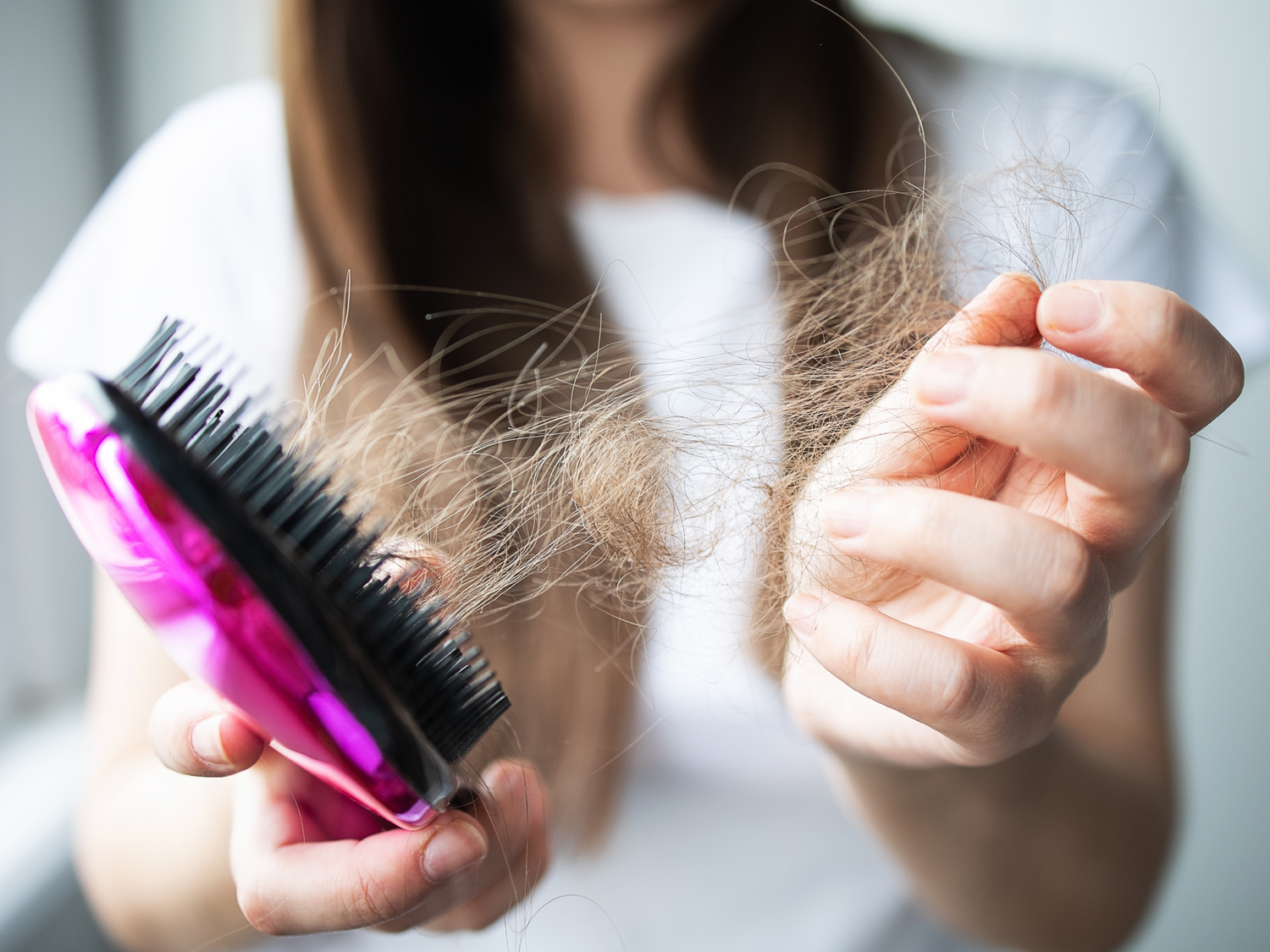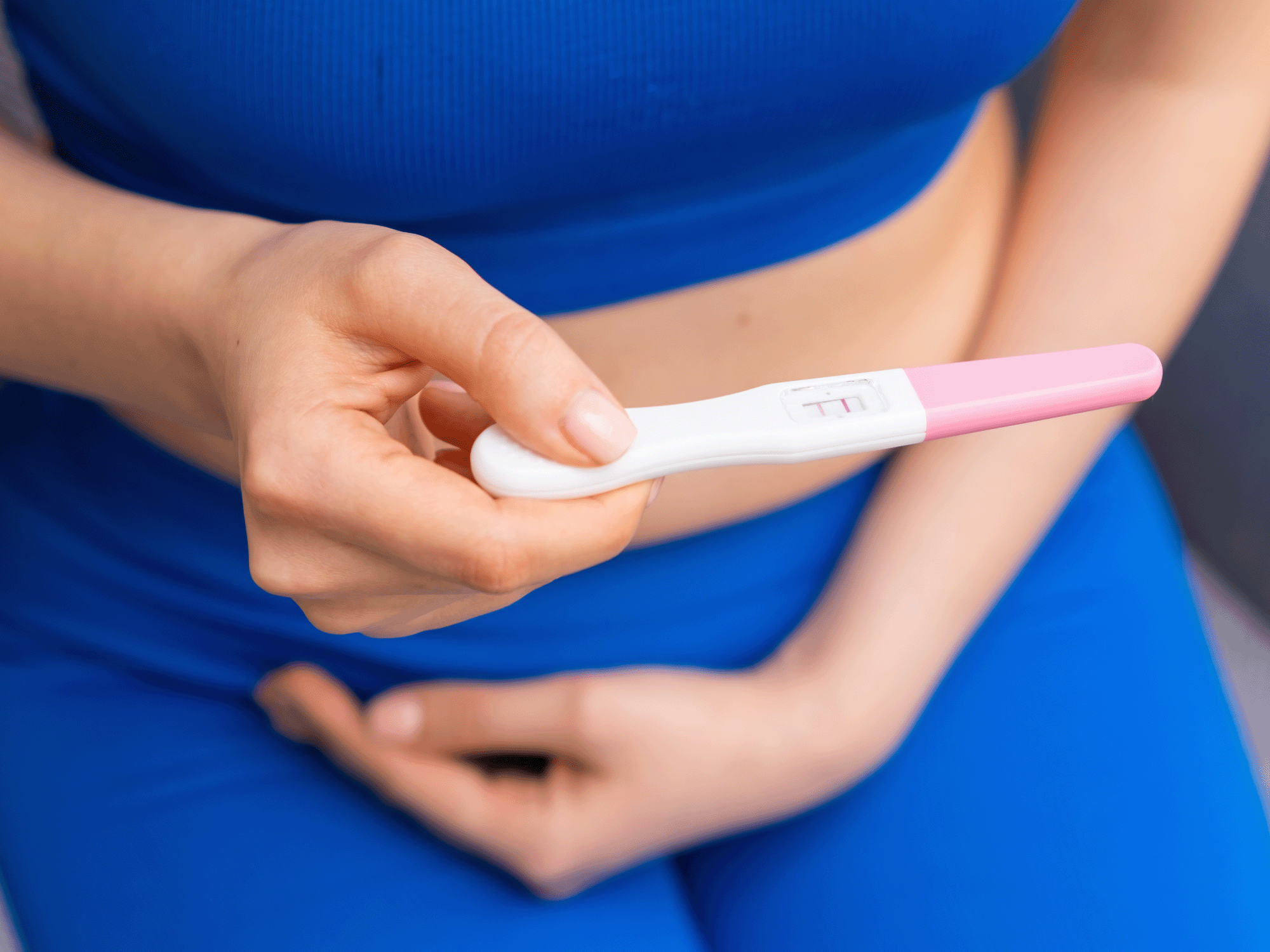Sarah stepped on the scale and smiled—she'd finally reached her goal weight after six months of dedicated effort. But when she ran her fingers through her hair that morning, her smile faded. Clumps of hair came away in her hands, far more than usual. What she didn't realize was that her successful weight loss journey had triggered an unexpected side effect that affects up to 40% of people who lose weight rapidly¹.
Understanding Hair Loss: More Than Just Genetics
When most people think about hair loss, they picture male pattern baldness or genetic factors. However, one of the most common types related to weight loss is called telogen effluvium.
Your hair follows a natural growth cycle with three phases: growing (anagen), transitional (catagen), and resting (telogen). Under normal circumstances, about 85-90% of your hair is in the growing phase. Telogen effluvium disrupts this balance, pushing more hair follicles into the resting phase, leading to increased shedding².
This type of hair loss typically appears 3-4 months after significant weight loss³. The delay occurs because existing hair continues to be held in place before eventually shedding, which often catches people off guard.
The Hidden Effects of Weight Loss Beyond the Scale
While the number on the scale provides immediate feedback, your body undergoes numerous internal changes that can significantly impact your health, including your hair.
Nutritional Absorption Changes
Rapid weight loss, particularly through restrictive diets or surgical procedures, can dramatically alter how your body absorbs nutrients. Your digestive system may struggle to extract essential vitamins and minerals from smaller food portions, leading to deficiencies even when you think you're eating healthily.
Blood Health Fluctuations
Iron levels can drop due to reduced dietary intake or poor absorption, while circulation patterns may change as your cardiovascular system adapts. These blood health changes directly impact hair follicles, which rely on proper circulation and adequate iron levels to maintain healthy growth.
Hormonal Shifts
Weight loss triggers substantial hormonal changes throughout your body. Leptin levels decrease, estrogen fluctuates, and stress hormones like cortisol may remain elevated⁴. These hormonal shifts can disrupt the delicate balance required for healthy hair growth.
The Weight Loss-Hair Loss Connection: When Success Becomes Stress
The connection between weight loss and hair loss centers around your body's stress response system. While losing weight benefits your overall health, rapid weight loss signals stress to your body, regardless of whether you feel stressed mentally.
The Timing Factor
Telogen effluvium typically begins 3-4 months after rapid weight loss and can continue for approximately 6 months. This delayed onset means people often don't connect their current hair loss to their past weight loss efforts.
Nutritional Deficiency Cascade
Restrictive diets and rapid weight loss can create a cascade of nutritional deficiencies that directly impact hair health. Iron, zinc, protein, biotin, and vitamins A, C, D, and E are all essential for healthy hair growth. When these nutrients become scarce, your body prioritizes vital organ function over hair production.
The Methods Matter
Different weight loss approaches carry varying risks for hair loss:
- Surgical weight loss: Procedures like gastric sleeve surgery can cause rapid weight loss and significant nutrient absorption issues
- Medicated weight loss: Medications such as GLP-1 agonists can lead to rapid weight loss, potentially triggering telogen effluvium
- Restrictive dieting: Crash diets or severely calorie-restricted approaches create both nutritional and physical stress
Monitoring Your Health During Weight Loss
The key to preventing or minimizing hair loss during weight loss lies in monitoring your body's internal health markers, not just the number on the scale.
Blood Health as an Early Warning System
Your blood health provides crucial insights into your nutritional status and overall wellness during weight loss. Iron deficiency, one of the leading causes of hair loss, can be detected months before hair shedding begins. Similarly, circulation changes can impact hair follicle health by reducing nutrient delivery to your scalp.
The Role of Iron in Hair Health
Iron deficiency is particularly common during weight loss and represents one of the most direct connections between weight loss and hair loss. Iron helps produce hemoglobin, which carries oxygen to your hair follicles. Without adequate iron, your hair follicles can't receive the oxygen they need for healthy growth.
Modern Monitoring Solutions
Technology has made it easier than ever to monitor these crucial health indicators. The Ruby app allows you to estimate your likelihood of iron deficiency through a simple fingernail selfie, providing an Iron Score that can help you track this vital nutrient throughout your weight loss journey. The app also offers a Circulation Score, giving you insights into your blood flow that can impact scalp and hair health.
Regular monitoring with tools like Ruby can help you catch potential nutritional deficiencies before they impact your hair, allowing you to make adjustments to your diet or seek medical guidance proactively.
Prevention and Management: Protecting Your Hair During Weight Loss
While the connection between weight loss and hair loss is real, it's not inevitable. With the right approach, you can minimize your risk and maintain healthy hair throughout your wellness journey.
Sustainable Weight Loss Practices
The most effective way to prevent weight loss-related hair loss is to pursue gradual, sustainable weight loss. Aim for 1-2 pounds per week rather than rapid drops that shock your system. This gentler approach allows your body to adapt gradually without triggering the stress response that leads to telogen effluvium.
Nutritional Guidelines for Hair Health
Focus on maintaining adequate nutrition even while creating a caloric deficit:
- Protein: Aim for 0.8-1 gram per kilogram of body weight daily, as hair is primarily made of protein
- Iron: Include iron-rich foods like lean meats, leafy greens, and legumes, and monitor your levels regularly
- Zinc: Incorporate nuts, seeds, and whole grains to support hair follicle health
- Vitamins: Ensure adequate intake of vitamins A, C, D, and E through varied, colorful foods
Stress Management
Both physical and emotional stress can contribute to hair loss. Incorporate stress-reduction techniques such as meditation, gentle exercise, or yoga into your routine.
When to Seek Medical Advice
Consult with a healthcare provider if you experience:
- Hair loss lasting longer than 6 months
- Hair loss accompanied by other symptoms like extreme fatigue, brittle nails, or skin problems
- Sudden, severe hair loss
- Any concerns about your nutritional status during weight loss
Conclusion
The journey toward better health through weight loss is commendable, but it's important to approach it with awareness of potential side effects like hair loss. Understanding the connection between rapid weight loss and telogen effluvium empowers you to make informed decisions about your health strategy.
Remember that weight loss-related hair loss is typically temporary. With proper nutrition, gradual weight loss, and careful monitoring of your health indicators, you can minimize your risk while still achieving your wellness goals. The key lies in taking a holistic approach that considers not just the number on the scale, but your overall health and wellbeing.
Don't let the fear of temporary hair loss derail your health journey. Instead, use this knowledge to pursue weight loss in a way that supports your entire body, from your cardiovascular system to your hair follicles.
Take action today: Download the Ruby app to monitor your iron levels and circulation throughout your weight loss journey. Early detection of nutritional changes can help you prevent hair loss before it starts.
Share this article with friends and family who might be embarking on their own weight loss journeys—knowledge is the best tool for maintaining both health goals and confidence.
References
¹ Medical News Today. "Weight loss and hair loss: What's the connection?"
² Cleveland Clinic. "Telogen Effluvium."
³ Healthline. "Weight Loss and Hair Loss: What's the Connection?"
⁴ Dr. Malay Mehta. "Does Weight Loss Cause Hair Loss?"





Leave a comment
This site is protected by hCaptcha and the hCaptcha Privacy Policy and Terms of Service apply.